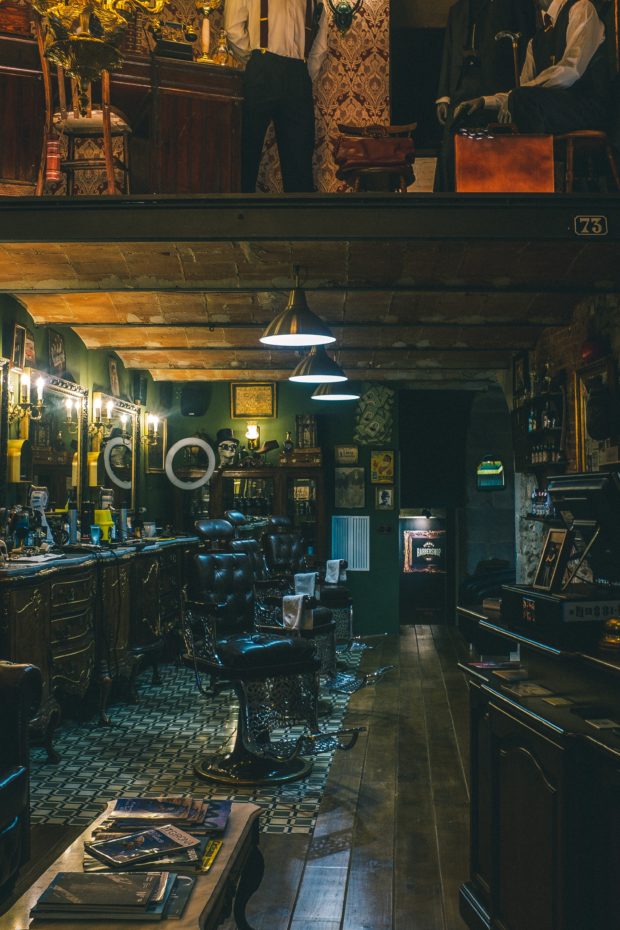You have no items in your cart. Want to get some nice things?
Go shopping
It is among the most hopeless of clichés, yet not without its certain bleak pointedness, to speak of time in a bar as having, in some way, stalled – the people in it, stalled – shivering frozen, pickled really, in the terrifying silence of frightening drinking. They drink with their mouths open. What they talk about is nothing. The place itself is nowhere: the closed door out onto the street; the fire door in the back propped open to the alleyway. Broken stools out there. Sunlight, grass, the smell of jasmine. Nothing happens here, not to these people, yet minutely, meaninglessly, they change. A woman comes into the bar one afternoon, her jasmine perfume, and becomes after a few weeks as a spectator the barman’s girl. Now she, too, is in it. Desolate with love, she and the others, one or two of whom, making a beggared advance, will all but throw himself at her, only to be kicked out by the chivalric bartender, so that what will pass between bartender and drunk is that hesitant look of blame, a melancholy, a resignation. Regulars disappear. Sick, they’ve heard. Ask Tom all about it. Even bartenders themselves will vanish in a restructuring of shiftwork, or off for a spell at one of the higher-class establishments where the customers tip money, where tulip glasses are used and not hung by their elegant stems in the overhead wood-slats, machines to catch smoke as though for cupping therapy; they reappear, or someone else does, and the response of the waiting crowd is as if a native son has returned. Charles is back! Where ya been, sport? They are grateful only for something to talk about. Charles has a tan, a burnt face and white above the knees, from scaling hulls six weeks in a shipping yard in Tampa. Pour us another round, sport. That is, if you still know how! In this way, the outside world, its adjuvants – everyday care, catchment moves, a bus ride; relationships built not on space but hunger; or a front door letterbox so full and flooding it could block an entrance hall like an upturned runner – are treated here as the equals of sobriety in unlit neighborhoods and far-flung places, which perhaps do operate, after all, under a different means, a different pressure of time, where surprisingly hearty molecules in the gray charm of the atmosphere collide with one another at enduring rates to build up revolution and real change; for it is simply impossible, far beyond the nature of thinking, to imagine dearest Charles should have merely laid stoned in a roadside motel, his mislaid passions around him, these absent months and hours. That tan! That new jacket! No one detail is frivolous enough to be completely lost, and the very dimness of this place, which hides freckles, moles, and laddered stockings, water stains, bad teeth, is more like the relief of an ancient movie house, each item observed a piece of laced silver in the brilliant screen four hundred feet high. A letter carrier, his hair striped with foam: The post office, man, says an idiot next to him trying to convince him to take an electric bill the rest of the way. They should have a transporter, like what’s-that-show. You put it in there, it disappears. He holds out an envelope balanced on two fingers. In the corner by a jukebox, two men in crew cuts, khaki shirts, fatigues, eloquently discuss the best piss they ever took. Could there really be such a thing? They are sitting very straight on two hard chairs, a thick frosted glass on the table between them, and a white tea candle, unlit, within it. Between the military obviousness of their dress and the general disinterest of the bar’s other patrons in this place with a picture wall of mourned dead and the predilection of its regulars to attend airshows or profess a harebrained conviction that the best part of any ballgame is a Blue Angels flyover, it appears they have been here all day. One of the men: Dan. Steve, perhaps. His name is Alex. He was shy for days in basic training. He pissed days, years. Pissed his heart away, his life. Suddenly, the front door opens. A rectangle of light is cast back into the bar, framing the new customer and keeping him in silhouette. A backpacker in outrageously heavy winter gear, he has less a face than the suggestion of one, with willowy knots of hair above his welder’s goggles and the soft mold of tape bandages obscuring ears, his cheeks, the chapped-lip mouth in a grimace no doubt. Some living paradox, a contradiction of genre, sea-grass tangles and the red dust of a desert cling as much to his boots as limp, dripping icicles. The bar’s patrons turn around to look at him. Charles himself! Or is it Ken? He unlocks his feet from skis, throws his nose into an umbrella stand. In the unexpected start of the stranger’s movements, tripping briefly on a rubber entrance mat that had upturned itself in the day’s slow traffic, a slice of exposed skin between the cuffs of his gloves and the stretch of his overcoat reveals not skin at all but a blank space, significant air. A shiver of menace could break through the place, yet in the half-silvered hollow where his nose should be, they see, perhaps, themselves. With each item of clothing removed, another shot gets lined up on the bar. People knock their glasses together, they pool change for tips or another song on the jukebox. Even the letter carrier in the back has given up his indifference for the man with the electric bill. It is the hour of charity now, the stranger in the doorway, still, as he lifts his goggles up and pulls the wet mask of his face down.

About Joseph Michaels
Joseph Michaels is a graduate of Hamilton College and Columbia University. His work has previously appeared in Passages North and Hindsight Magazine. He teaches English.




